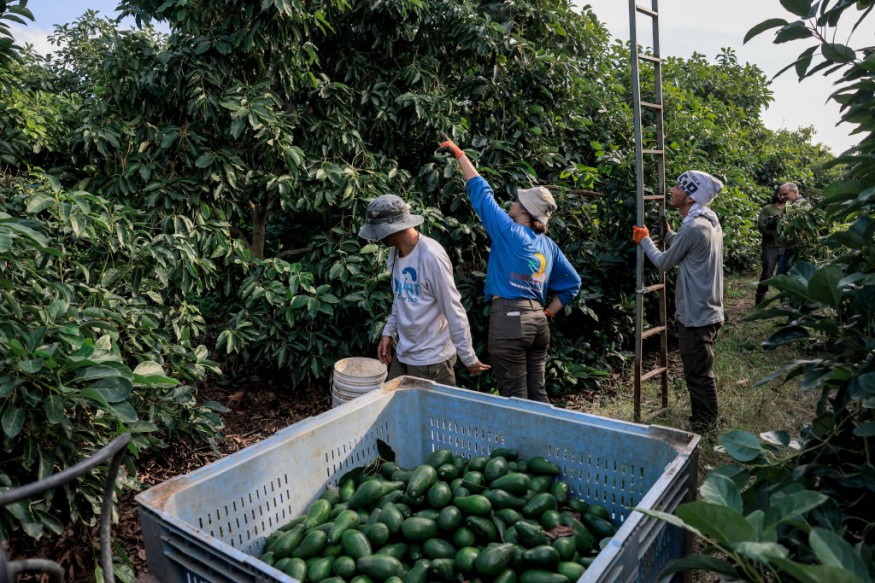
Climate change is making droughts worse in many of the major avocado-producing countries around the globe.
According to a new analysis, there may be a significant change in the growing regions of the water-loving fruit in the next 25 years, as well as a decrease in the total amount available.
Production To Decline
According to studies referenced in the UK-based charity Christian Aid's most recent report, Getting Smashed: The Climate Danger Facing Avocados, production in what are currently regarded as premium areas is anticipated to fall by 14% to 41% by 2050.
Grown primarily for export, avocados are a famously thirsty crop that has drawn criticism for their large water footprints. For example, growing avocados requires around four times the amount of water as growing oranges.
Commercial fruit cultivation frequently strains aquifers in nations like Mexico, Chile, and Spain, where water supplies are already scarce.
Additionally, their heat tolerance limits can be a challenge given the rising frequency of heatwaves observed globally.
"Avocado production may not be down and out with climate change, but [geographic shifts in growing conditions] would cause major problems for current growers, with many being put out of business," the study said.
In the 2010s, avocados, which are considered superfoods because they are rich in fiber and good fats, became popular, being linked to pricey brunch menus and millennials.
President of Farmer's Pride Burundi and avocado farmer Jolis Bigirimana stated that climate change "is a huge problem, especially for avocado growers" in his African nation.
"We are experiencing hot temperatures, heavy rain, and erosion, which is having a terrible impact on farmers' productivity and their income. It now costs us a lot of money to water our crops," he added.
The world is currently expected to rise by 2.5-2.9 degrees Celsius over pre-industrial levels, which is significantly more than the 1.5-2 degrees Celsius target set by the Paris Agreement but far less than previous projections following new energy and climate policies.
There are other ways that climate change can make life harder for avocado trees besides merely altering their ideal climate. Because trees are pruned more frequently in high-density growing settings, fungal diseases can spread quickly.
However, heavy rains can also enhance spore production and infection, with rain splashing being one way of infection. In addition, trees under stress from other sources, like inadequate irrigation, dietary stress, and widespread insect infestation, are also more vulnerable to fungal diseases.
Thus, it is possible to consider climate change as a hazard to tree survival that interacts intricately with other elements of the agricultural ecosystem in addition to being a direct threat.
Recommendation
The study has three recommendations to save the avocado tree from further damage.
More funding for climate change to support adaptation
Climate finance will be the main focus of this year's COP29 in Baku, where countries will be negotiating a new long-term financing target for those impacted by climate disruption. Finance is critically needed in order to assist individuals in adjusting to the effects of the climate catastrophe.
Growers of avocados and other agricultural workers who depend on a stable climate for their livelihoods require assistance in diversifying their sources of income, creating more hardy plant kinds, and assisting them in adjusting to a climate that they have done very little to alter.
Reduce emissions to address the underlying problem and hasten the switch from dirty to clean energy.
If carbon emissions keep rising, the harsh weather that threatens avocados and the means of subsistence for their growers will only get worse. Developed nations made a commitment to move away from fossil fuels this decade at COP28 in Dubai.
Make polluters pay for their losses and damages.
The world must take loss and damage seriously since people are already experiencing the effects of climate change beyond what can be achieved via mitigation and adaptation.
The researchers stressed that it is now necessary for polluters to begin bearing the consequences of their actions and to be made to accept accountability for the chaos they have created. To help those who have suffered the most from climate change, the enormous profits made by fossil fuel companies ought to be taxed and the proceeds deposited into the Loss and Damage Fund.
Related Article : Eating Avocado Linked With Better Nutrient Intake, Diet Quality
© 2025 NatureWorldNews.com All rights reserved. Do not reproduce without permission.





